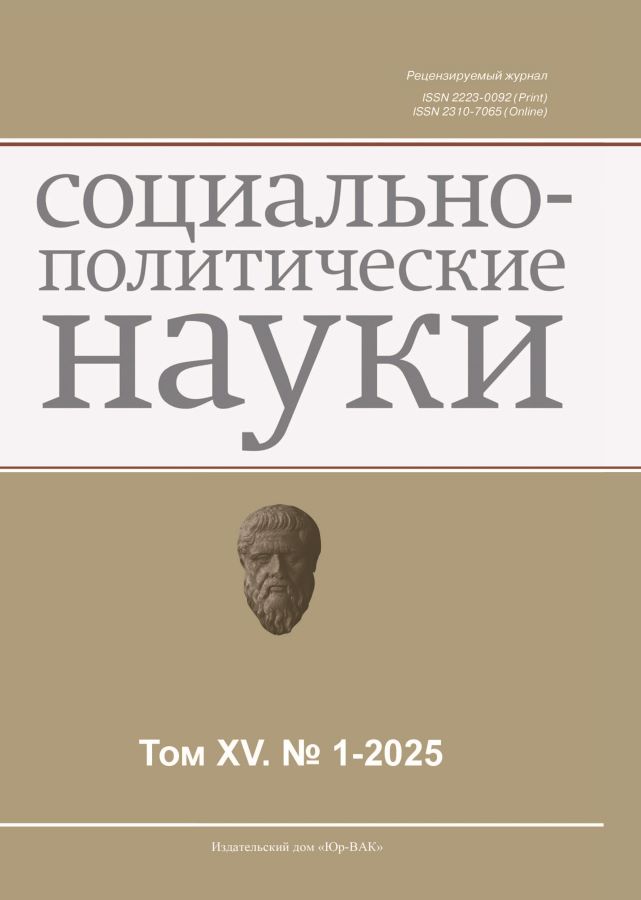Russia’s political and legal experience regarding the use of Artificial Intelligence in domestic and foreign policy
- Авторлар: Zagaynov M.R.1
-
Мекемелер:
- Financial University under the Government of the Russian Federation
- Шығарылым: Том 15, № 1 (2025)
- Беттер: 110-118
- Бөлім: National Security of Russia
- URL: https://journals.eco-vector.com/2223-0092/article/view/679146
- DOI: https://doi.org/10.33693/2223-0092-2025-15-1-110-118
- EDN: https://elibrary.ru/JEQTDU
- ID: 679146
Дәйексөз келтіру
Аннотация
Scientific and technical development of Russia does not stand still. In recent years, we have been talking about the use of artificial intelligence (AI) in all spheres of life in Russia, including politics. In his article, the author notes the stages the country has gone through in its desire to streamline and develop rules and laws for the use of AI in political management. The author aims to analyze the political and legal experience of Russia in relation to the use of artificial intelligence in domestic and foreign policy. The author comes to the conclusion that in recent years there has been an active development of the regulatory framework for the Russian Federation’s policy in the field of AI, there is a tendency to increase funding for projects in this area. Along with large Russian companies, government bodies at various levels are increasingly turning to AI technologies. And for example, if we talk about Russian diplomacy, AI technologies also bring certain benefits – the ability to analytically process a large array of information, simplifying the daily routine work of consular offices. It should also be noted that today Russia is already among the top ten leaders in the field of AI, but on this path our country still has a lot to do to strengthen and consolidate its position on the world stage, since leadership in the field of ICT and AI is a necessary element for the country to take a leading position in the world hierarchy.
Толық мәтін
Авторлар туралы
Mikhail Zagaynov
Financial University under the Government of the Russian Federation
Хат алмасуға жауапты Автор.
Email: ni22nn@mail.ru
ORCID iD: 0000-0002-8913-849X
SPIN-код: 7299-4810
Cand. Sci. (Econ.), head teacher
Ресей, MoscowӘдебиет тізімі
- Artamonov G.T., Kristalny B.V., Kurnosov I.N. et al. On the conceptual framework for building an information society in Russia. Information Society. 1999. No. 3. Pp. 16–19. (In Rus.)
- Begishev I.R. The concept of the development of regulation of relations in the field of artificial intelligence and robotics technologies: An analysis of the main provisions. Baikal Research Journal. 2020. Vol. 11. No. 4. (In Rus.). doi: 10.17150/2411-6262.2020.11(4).15.
- Volokitin A.V., Kurnosov I.N. The role of the state in the development of the information society in 2000. Information Society. 2000. No. 1. Pp. 8–11. (In Rus.)
- Grishanina T.A. Artificial intelligence in international relations: The role and directions of research. Bulletin of the Russian State University of Economics. Series: Political Science. History. International relations. 2021. No. 4. Pp. 10–18. (In Rus.)
- Gurfova R.V., Shumakhova K.S. The development of the information society in Russia. Scientific News. 2019. No. 15. Pp. 36–39.
- Zinovieva E.S., Tsvetkova N.A., Sidorenko E.L. et al. “Digital” and artificial intelligence in the service of diplomacy: An analytical report. E.S. Zinovieva (ed.). Moscow: MGIMO University, 2024. 68 p.
- Kuznetsov N.M., Tsvetkova N.A. Diplomacy of Russian data: Goals, trends, forecasts. Bulletin of the Russian State University of Economics. Series: Political Science. History. International Relations. 2022. No. 1. Pp. 26–40.
- Sister V.G. Information technologies in the service of the city. Information Society. 2003. No. 1. Pp. 22–24. (In Rus.)
- Tsvetkova N.A. The phenomenon of digital diplomacy in international relations and the methodology of its study. Bulletin of the Russian State University of Economics. Series: Political Science. History. International Relations. 2020. No. 2. Pp. 37–47. (In Rus.)
- Chereshkin D.S., Tsygichko V.N., Smolyan G.L. The system of information and marketing centers is a basic element of the information infrastructure of electronic commerce. Information Society. 2003. No. 2. Pp. 42–49. (In Rus.)
- Chulanova O.L., Fomina E.V. Artificial intelligence as the main trend in the development of the information society. Journal of Sociological Research. 2019. No. 2. Pp. 6–10.
- Krasnyak O. Foreign ministry’s spokesperson in public diplomacy: A case of Russia. Russian Journal of Communication. 2020. No. 2. Pp. 155–170.
Қосымша файлдар








